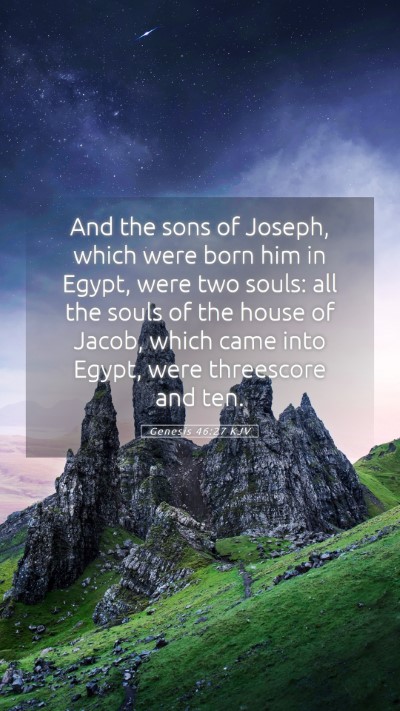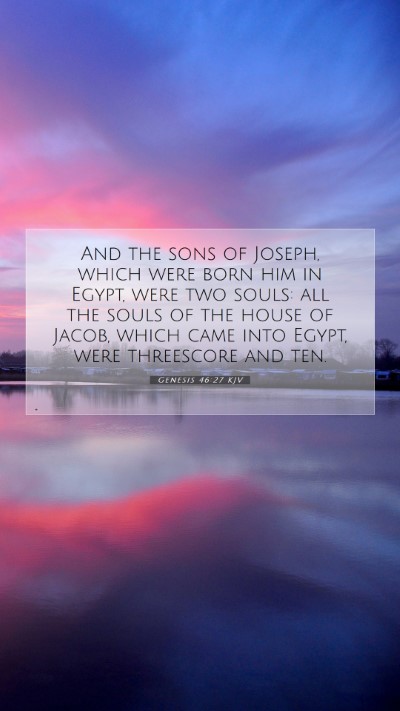Bible Verse Meaning: Genesis 46:27
Genesis 46:27 states: "And the sons of Joseph, which were borne unto him in Egypt, were two souls: all the souls of the house of Jacob, which came into Egypt, were threescore and ten."
Overview and Context
The verse signifies a key moment in the narrative of Jacob and his family as they migrate to Egypt during a time of famine. This brings together the themes of family, providence, and the unfolding of God's plan.
Bible Verse Interpretations
The verse provides a count of Jacob’s family members making the journey to Egypt, emphasizing the significance of the family structure in the unfolding biblical story:
- Matthew Henry: Henry emphasizes the importance of the number of Jacob’s family members as it signifies God’s promise to multiply them. The inclusion of Joseph’s sons borne in Egypt illustrates that they were part of the larger covenant family.
- Albert Barnes: Barnes notes that the mention of “two souls” for Joseph’s sons represents not just their physical presence but their identity as heirs to God’s promises. This reinforces the continuity of the covenant through generations.
- Adam Clarke: Clarke points out the exact count of seventy as significant, relating it back to the promises of God to Abraham regarding his descendants, indicating a fulfillment of those promises even amid trials.
Significance of the Count
This verse serves as a pivotal point in the narrative, summarizing the sense of community and belonging among Jacob's descendants as they arrive in Egypt:
- Family Unity: The migration signifies not just physical travel but also the unity and shared identity of God's chosen people.
- Historical Context: The family structure and their movement into Egypt set the stage for later events in Exodus, demonstrating God’s sovereignty over their journey.
- Fulfillment of Promises: The number seventy stands out as a fulfillment of God’s promise to Abraham, thus reflecting on the broader narrative of God working through history.
Biblical Exegesis
Understanding this verse through exegesis involves looking at cultural, historical, and theological perspectives:
- Cultural Significance: In ancient Near Eastern culture, genealogy and family lineages were vital for identity and inheritance, underscoring the importance of counting Jacob’s family.
- Theological Reflection: God's providence in caring for Jacob's family during the famine sets the tone for God’s ongoing relationship with Israel.
Application to Daily Life
Genesis 46:27 encourages modern readers to reflect on the importance of family and community within the faith:
- Bonding Together: Just as Jacob's family united to seek refuge, believers today are called to support one another in times of need.
- Count Your Blessings: Reflecting on our own families and communities can deepen our gratitude for the support and heritage we have received.
Related Bible Cross References
- Genesis 15:5 - God's promise of multiplying Abraham's descendants.
- Genesis 37 - The story of Joseph, setting the backdrop for this migration.
- Exodus 1:5 - The growth of Jacob's family into a nation while in Egypt.
Conclusion
Genesis 46:27 encapsulates essential themes of unity, fulfillment of divine promises, and God's guidance of His people through familial connections. As one seeks Bible verse meanings or engages in Bible study groups, this verse serves as a foundational point for understanding what it means to belong to God’s family.


